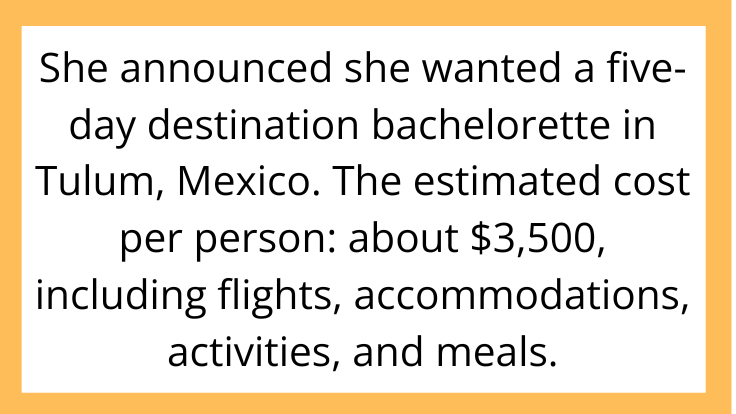AITAH for Refusing to Pay for My Best Friend’s Destination Bachelorette Party?
When friendships and finances collide, even the closest bonds can fracture under the pressure. In this AITAH scenario, one woman finds herself accused of being cheap, selfish, and unsupportive—all because she declined an expensive invitation she simply couldn’t justify.
Let’s look at the full story and see who’s really in the wrong.
The Backstory: An Invitation That Came With Strings Attached

A 28-year-old woman—let’s call her Emma—shared her story on r/AITAH. She and her best friend, Chloe, have been inseparable since college. They’ve weathered breakups, job changes, and cross-country moves together.
When Chloe got engaged, Emma was thrilled. She happily agreed to be the maid of honor, offered to help with planning, and assumed the bachelorette party would be something manageable—like a weekend in their city or a short road trip.
But Chloe had other plans.
She announced she wanted a five-day destination bachelorette in Tulum, Mexico. The estimated cost per person: about $3,500, including flights, accommodations, activities, and meals.
Emma was stunned.
The Turning Point: Setting a Financial Boundary

Emma earns a decent salary, but she also has student loans, rent, and a modest emergency fund. She immediately knew this trip was out of reach.
She called Chloe to explain that she simply couldn’t afford to spend that much money and asked if she could either opt out or help plan something more budget-friendly.
Chloe didn’t take it well.
She accused Emma of being unsupportive and selfish. She pointed out that all the other bridesmaids had already agreed and paid their deposits, and Emma’s refusal was going to “ruin the vibe.”
Emma offered to contribute to a dinner or local event instead, but Chloe said if Emma couldn’t come to the trip, she would find another maid of honor.
Friends or Customers? When Celebrations Become Transactions

Weddings and bachelorette parties have become increasingly extravagant over the past decade, but at what cost?
In Emma’s situation, the pressure to say yes wasn’t about love or friendship—it was about compliance. Chloe’s reaction suggests she equated Emma’s financial contribution with her loyalty.
It begs the question: Are we still celebrating milestones, or are we demanding others subsidize luxury experiences under the guise of “support”?
Reddit’s Verdict: Sympathy for Emma

The overwhelming majority of Reddit commenters took Emma’s side.
“You’re not a villain for having a budget,” one top comment read. “It’s absolutely unreasonable to expect your friends to drop thousands of dollars on a party.”
Others pointed out that real friends don’t punish each other for setting healthy financial boundaries.
“If she’s willing to kick you out over this,” another commenter wrote, “you’re not her maid of honor. You’re her wallet.”
The Bigger Issue: Financial Compatibility in Adult Friendships

Money has a sneaky way of revealing compatibility, even in friendships. When some friends can afford luxury getaways and others can’t, it can create resentment and guilt on both sides.
Emma’s experience isn’t unique. In fact, surveys show that nearly 40% of millennials have gone into debt to attend weddings and related events. Yet few feel comfortable speaking up.
Here are a few strategies to navigate these situations:
-
Be Honest Early: As soon as costs are discussed, communicate your limits.
-
Offer Alternatives: If you can’t join the main event, suggest another way to celebrate.
-
Respect Others’ Budgets: Never shame someone for declining an invitation they can’t afford.
-
Remember Your Values: True friendships don’t hinge on extravagant spending.
What Emma Could Do Next

Emma has a few options:
-
Reaffirm her boundary calmly and accept that Chloe may replace her as maid of honor.
-
Offer to celebrate locally or help in other ways.
-
Reflect on whether this friendship is as reciprocal and supportive as she believed.
It’s painful to stand firm when someone you care about is disappointed, but self-respect is worth protecting.
Takeaway: Declining Debt Doesn’t Make You Selfish

In this AITAH scenario, Emma isn’t refusing to celebrate Chloe—she’s refusing to jeopardize her own financial stability to meet someone else’s expectations.
That doesn’t make her cheap. That makes her responsible.
Sometimes, saying “no” is the most honest way to show up for yourself—and ultimately, the people you care about.



